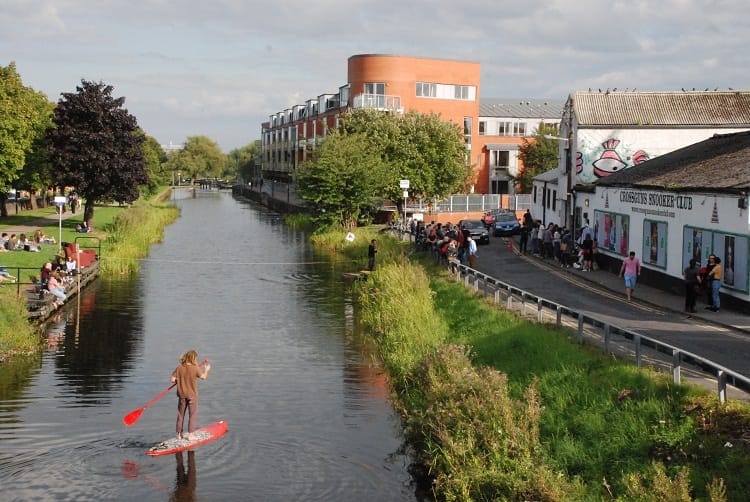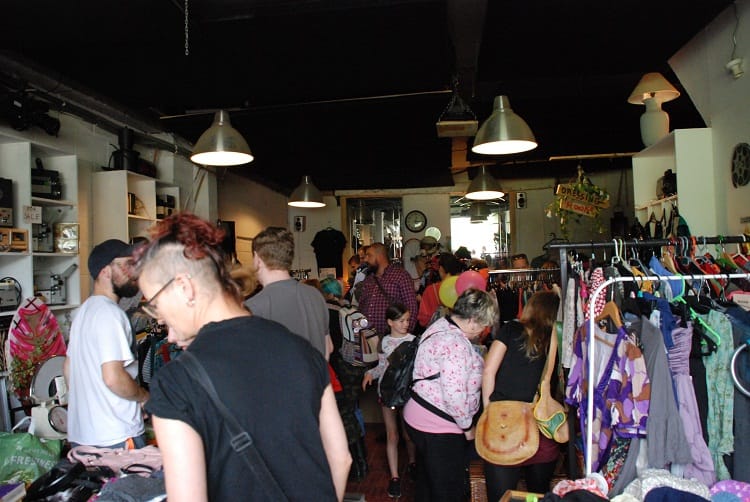What’s the best way to tell area residents about plans for a new asylum shelter nearby?
The government should tell communities directly about plans for new asylum shelters, some activists and politicians say.
Michael Higgins has been inspired by the ethos of flea markets elsewhere to set up a one in Phisboro, with few rules but mandatory baking.

“Mind yer backs!” shouts the clown in Lycra tights and a police uniform, as he directs traffic by the banks of the Royal Canal.
He blows a whistle, to alert those gathered for the market to an approaching car.
By the shore, another clown in a pillbox hat starts rowing a market-goer across the waterway on a makeshift raft.
At the mooring on the opposite bank, two women sit in armchairs, with clothes hung on the rails. Guitars and fiddles sound up. The Uncool Flea Market begins.
It’s 4:30pm on Saturday and locals line the banks near the Crossguns Snooker Club in Phibsboro and soak up the fading rays.
To Michael Higgins, a local film-maker, it seemed like a good time of year to debut the area’s new flea market.
He bought the space adjoining the snooker club three months ago, and straightaway touched base with Jule Osten, a friend he’d first met in Detroit, where she ran a flea market in a rundown part of the city.
He’d witnessed how flea markets could bring folks together. “It was like a strange, emotional, post-war zone where communities were left on their own with no infrastructure,” he says. “Schools, hospitals, libraries, they were just run by people, local people.”

When little else is on the table, flea markets provide a local space to gather, to trade and to haggle, and are, by their very nature, unrestricted, says Higgins. “I’m a big fan of junk, second-hand items, recycling, bringing a new life to things and discovering things.”
In a lot next to the snooker hall on Saturday, 11 vendors set up to sell, give or take, anything at all indoors.
There were the usual clothes, books, records, and jewellery. Some had gathered unwanted junk from their homes to sell for cheap.
Six Beanie Babies. A rusted kettle. Billy Preston’s thirteenth studio album, Billy Preston. Per chance that single Nintendo DS game is what you’re in the market for?
“It comes back to people just getting rid of their junk,” says Higgins. “They need to get rid of it. They’ll take anything for it. It’s very casual.”
The setup for the Uncool Flea Market is simple, says Higgins. There’s no fee for stall vendors. Instead you’re asked to prepare a homemade dish that is sold on the day.
On offer on Saturday afternoon were blueberry cheesecake, empanadas, cheesy broccoli tart, and pancakes with dulce de leche.
Haggling is encouraged and none of the items have price labels. It’s a model that’s closer to what he considers a true flea market, says Higgins. He learnt that from his friend Jule Olsten.
Osten set up her first flea market in her hometown of Bremen, in Germany about seven years ago.
Since 2010, she has researched the history and social importance of flea markets, particularly in Germany and America. She cites PhD theses on the subject such as A Tale of Two Markets: The People and Culture of American Flea Markets by Angelia Riveira.
“Because flea markets brought people with shared interests together – whether that shared interest was collecting car memorabilia, browsing antiques and collectibles, or sharing in a common culture – they also helped to build communities,” wrote Riveira in 2013.
From Bremen to Berlin, Detroit and now to Dublin, at each new flea, Osten says she “wants to retain the same model and design”.
In short, to create a communal space rather than a commercial entity. “Each time I do this in a different city it’s like I’m writing a play,” says Osten. “The actors are different. The scene is different.”
But her script remains largely the same. “For me it’s not quite work, not quite home,” says Osten, pouring hot coffee for a flea-goer. “It’s somewhere in between.”

The Haggle
As the afternoon rolls on, the squeeze inside the flea becomes tighter as people pause to consider racks of clothing, boxes of books and outdated film equipment.
Outside, more people make their way across to the mooring via a makeshift raft. The law-enforcement clown wags his baton at a confused looking terrier. “Hey you, no barking now d’ya hear me?” he warns.
Higgins expects to hold the next flea there “within a month” and again after that with the same ethos and model. “We can’t wait to do it again,” he says.
A crowd gathers by the bank. Alone on the raft, the chain gang clown looks shaky.
Some whoop and holler in support. As he nears the opposite mooring, he sticks one foot out and takes the final leap.
Straight into the drink. He emerges sodden, red nose glimmering in the sun.
Get our latest headlines in one of them, and recommendations for things to do in Dublin in the other.